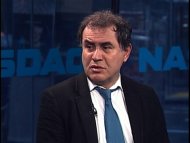kmdh
JF-Expert Member
- May 19, 2010
- 503
- 120

[h=1]US Economy Going From Bad to Worse: Roubini[/h]
 By Patrick Allen | CNBC 14 hours ago
By Patrick Allen | CNBC 14 hours ago@cnbc on Twitter
A robust and self-sustaining U.S. recovery is not on the cards, and we should now expect below trend growth for many years to come, according to Nouriel Roubini, the economist famed for his bearish views.

"Even this year, the consensus got it wrong, expecting a recovery to annual GDP growth of better than 3 percent," the founder of Roubini Global Economics wrote.
"And now, after getting the first half of 2012 wrong, many are repeating the fairy tale that a combination of lower oil prices, rising auto sales, recovering house prices, and a resurgence of U.S. manufacturing will boost growth in the second half of the year and fuel above-potential growth by 2013."
Roubini believes the U.S. economy will slow further this year and next as expectations of the "fiscal cliff" keep spending and growth lower - and uncertainty about the outcome of the presidential election dogs markets.
The fiscal cliff could knock 4.5 percent off 2013 growth if all tax cuts and transfer payments were allowed to expire and spending cuts where triggered, according to Roubini.
"Of course, the drag will be much smaller, as tax increases and spending cuts will be much milder. But, even if the fiscal cliff turns out to be a mild growth bump - a mere 0.5 percent of GDP - and annual growth at the end of the year is just 1.5 percent, as seems likely, the fiscal drag will suffice to slow the economy to stall speed: a growth rate of barely 1 percent," he wrote.
The U.S. consumer, which drives plenty of the global economy as well as the U.S., will not be able to keep spending when $1.4 billion worth of tax cuts and extended transfer payments come to an end according to Roubini.
"In 2013, as transfer payments are phased out, however gradually, and as some tax cuts are allowed to expire, disposable income growth and consumption growth will slow. The U.S. will then face not only the direct effects of a fiscal drag, but also its indirect effect on private spending," he wrote.
The problems in the euro zone, a slowdown in China and emerging markets, added to the chance that oil prices could be driven higher by tensions over Iran's nuclear program, will also add to America's economic woes, Roubini argued.
He warned the Fed will not be able to ride to the rescue this time.
"The U.S. Federal Reserve will carry out more quantitative easing this year, but it will be ineffective: long-term interest rates are already very low, and lowering them further would not boost spending," he wrote.
"Indeed, the credit channel is frozen and velocity has collapsed, with banks hoarding increases in base money in the form of excess reserves. Moreover, the dollar is unlikely to weaken as other countries also carry out quantitative easing."
Roubini also argued that earnings growth is now beginning to run out of steam, after buoying markets earlier in the economic cycle. The second-quarter earnings season has so far presented a mixed picture.
"A significant equity-price correction could, in fact, be the force that in 2013 tips the US economy into outright contraction. And if the U.S. starts to sneeze again, the rest of the world - its immunity already weakened by Europe's malaise and emerging countries' slowdown - will catch pneumonia," he warned.
US Economy Going From Bad to Worse: Roubini - Yahoo! Finance